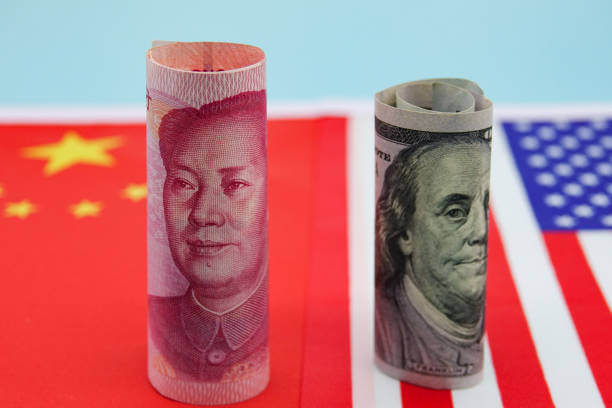According to the data released by the United States (US) Department of Treasury on Monday, China has reduced its American holdings for the seventh consecutive month, marking a 12-year low amid rising tensions between the two countries regarding Taiwan.
China’s holdings of US treasuries dropped from $980.8 billion in May to $967.8 billion in June, a drastic cut from $1.06 trillion last June. In fact, its holdings of US treasuries are at their lowest level since May 2010, when it held $843.7 billion.
According to ING’s global head of markets, Chris Turner, the continual sale of US treasuries could be an attempt to keep the Chinese yuan “stable in a strong dollar environment,” especially since the yuan has fallen sharply compared to the dollar amid concerns about the Chinese economy coping with the COVID-19 pandemic and the US interest rate hikes.
🇨🇳 🇺🇸 #China pares back holdings of U.S. Treasuries for 7th month – Reuters
— Christophe Barraud🛢🐳 (@C_Barraud) August 16, 2022
*It marks the seventh straight drop and the lowest level since May 2010.https://t.co/yGw5lQSaHW
Moreover, the US dollar (USD) has been mostly stable against the Chinese yuan (CNY) after reaching a 20-month high in May this year, decreasing about 1%. The USD was last up 0.5% at 6.7755 CNY.
Tan Yaling, the head of the China Forex Investment Research Institute, told Chinese state-owned media outlet Global Times on Tuesday that the downward trend could be a sign of Beijing wanting to diversify its forex reserves and “make room for the country to increase holdings of other assets” in order to put itself in a better position to tackle risks. She noted that this would be in line with five Chinese-owned companies announcing their departure from the US stock exchanges on Friday.
However, both Tian Yun, the former vice director of the Beijing Economic Operation Association, and Guan Tao, the chief global economist at BOC International (China) Co and a former senior official at the State Administration of Foreign Exchange (SAFE), attributed the reduction to a depreciation in US bond prices and an appreciation of US bond yields.
When people wonder why stocks and bonds fell together since Dec'21, when they typically go in opposite directions, it makes sense to me given the Fed's tightening policies. But perhaps China's dumping of US assets contributed also. https://t.co/N9XlB9vlqs
— David Brady (@GlobalProTrader) August 15, 2022
China’s net purchase of US long-term securities totalled $3.17 billion in June, with $248 million of net sales in Treasury bonds, $4.09 billion in net purchases of agency bonds, $101 million in net corporate bond purchases, and $778 million in net sales of corporate stocks, which corroborated the US Treasury’s overall data.
“The sum total in June of all net foreign acquisitions of long-term securities, short-term US securities, and banking flows was a net Treasury International Capital inflow of $22.1 billion. Of this, net foreign private inflows were $23.1 billion, and net foreign official outflows were $1.1 billion,” the Treasury Department said in a statement.
Tian also predicted that the current cycle of interest rate hikes would stabilise by the second quarter of 2023.
Meanwhile, ING’s Turner did not rule out the changing geopolitical scenario as being the reason for the decrease. Despite severe warnings from China which considers Taiwan to be its territory, US House Speaker Nancy Pelosi visited the island earlier this month to “honour” Washington’s “unwavering commitment to supporting Taiwan’s vibrant democracy.” In response, China began and extended unprecedented live-fire drills near Taiwan, even firing ballistic missiles over the island nation.
The US claims China is escalating the situation & overreacting. But the US took the first step to provoke China on the Taiwan question. China had made the utmost efforts to prevent this crisis imposed on China. To our regret, the US chose not to listen. @AmbQinGang 2/3
— Zhang Meifang张美芳 (@CGMeifangZhang) August 17, 2022
Furthermore, the Chinese Foreign Ministry announced that it is taking strict countermeasures to express its “strong opposition” to the high-level visit, cancelling the: Theatre Commanders Talk, Defence Policy Coordination Talks (DPCT), and the Military Maritime Consultative Agreement (MMCA) meetings. It also suspended cooperation regarding the repatriation of illegal immigrants, legal assistance in criminal matters, transnational crimes, counternarcotics, and climate change.
“A further decline in China’s US Treasury holdings looks likely as geopolitical spheres of influence sharpen after Russia’s invasion of Ukraine and the seizure of Russian FX reserves,” Turner noted. In a similar vein, SGH Macro Advisors’ Sassan Ghahramani pointed out that reducing “USD exposure has been an ongoing strategic objective of Beijing’s, […] which is now repeatedly being reemphasised in private by officials and is apparently being accelerated.”
However, China is still the second-largest holder of US debts after Japan, which currently holds $1.2 trillion in American treasuries.

